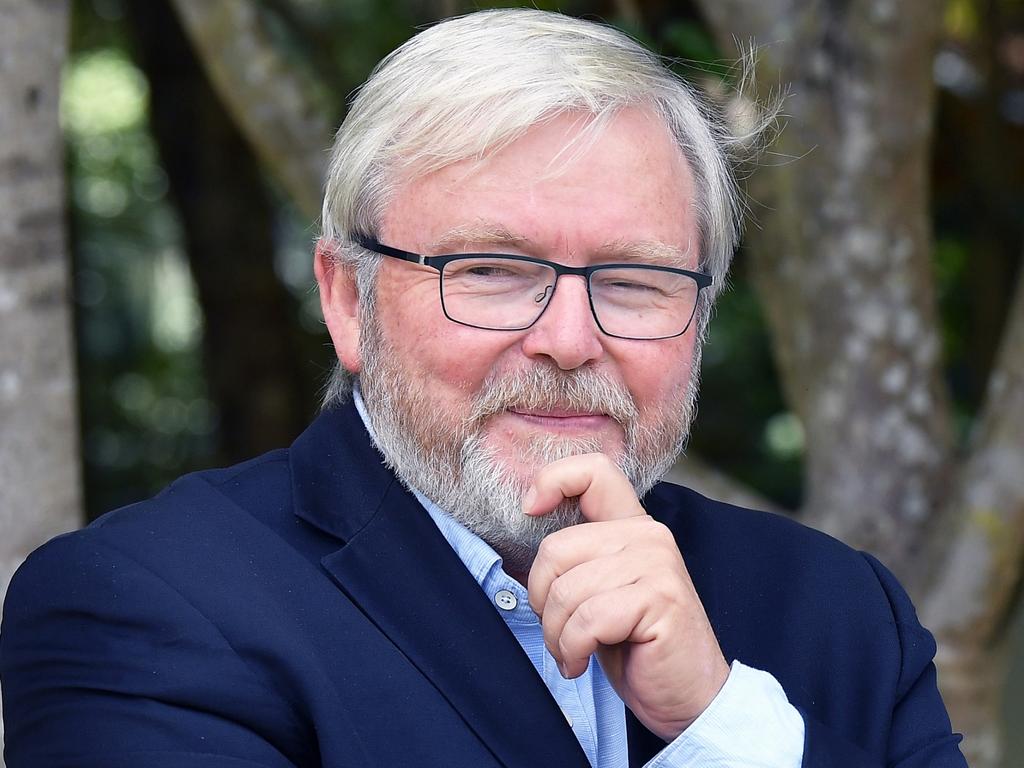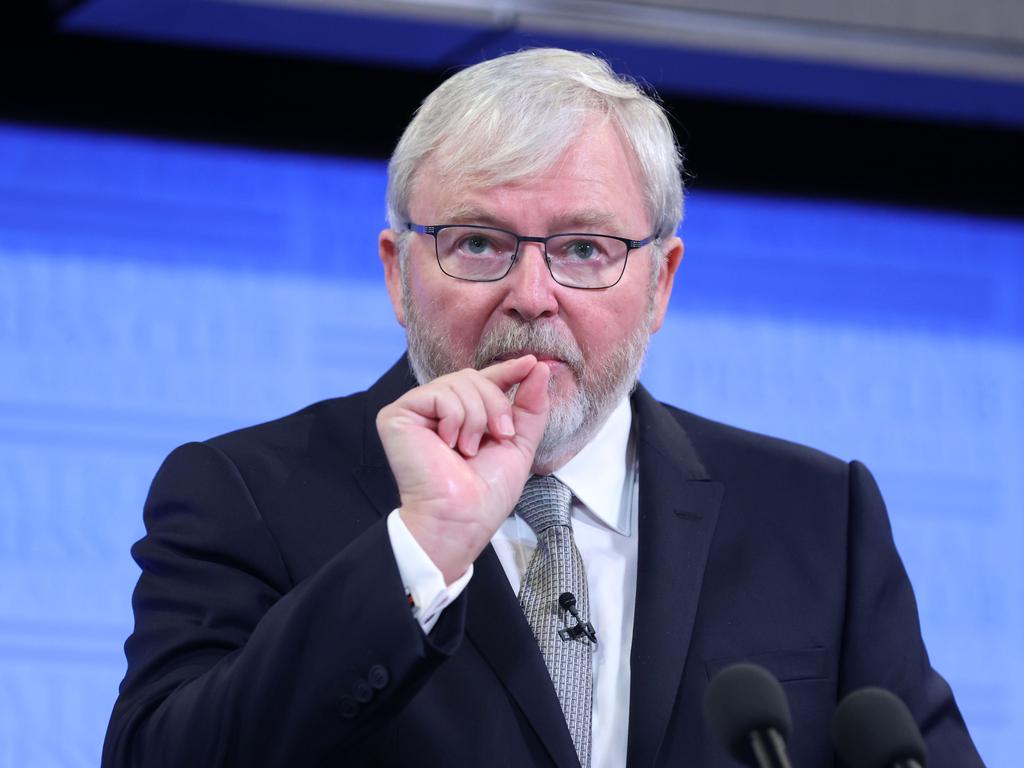Kevin Rudd is the crisis hero you don’t need


No one could doubt his sincerity, his inherent altruism, or that this country was the better for his leadership. Sadly, his tenure as prime minister was brief. A shallow and ignorant electorate believed the false reports by a nefarious and agenda-driven media the Rudd government was chaotic, dysfunctional, wasteful, and incompetent.
A lesser man would be forever embittered at this callous rejection. But being a good Christian and churchgoer, Rudd espouses charity and forgiveness, as well as loving one’s enemy. Revenge and malice are anathema to him. Aside from his daily petulant and puerile tweets lampooning #ScottyFromMarketing, aside from constantly raging against who have wronged him, and aside from his incessant calls to use the machinery of state to implement his version of a free press, Rudd has been a happy little Vegemite.
But considerations such as the welfare and comfort of self are irrelevant to a man of destiny. As reported by the ABC, anonymous Australian US-based business figures – faceless men if you will – allegedly prevailed upon Rudd to overcome the second-greatest moral challenge of our time. Australians were facing a dearth of vaccine supplies because of the Morrison Government’s shilly-shallying. What was to be done?

According to Rudd, these anonymous figures expressed concern Pfizer had found the Australians “rude” and “dismissive”. Naturally these business figures turned to one renowned for his manners and his willingness to consider the views of others. Could Rudd informally approach Pfizer chair and CEO Albert Bourla? Enter Kevin, self-appointed emissary of the Australian people.
“I was simply doing my small bit when asked to by Australian business”, he told ABC Radio National on Tuesday. “Did it materially help at the end of the day? I’m in no position to judge,” he added modestly. “I thought it was the right and positive and constructive thing to do,” he said, emphasising the attributes which have long endeared him to us.
Rudd was coy about the names of the business figures who allegedly approached him. “Why are Australian corporates unwilling to put their hand up and identify themselves by name,” he asked rhetorically.
“The Morrison government has a habit of punishing people, whether you’re an academic, whether you’re a business leader or anybody else who dares to speak out either against Morrison or his Murdoch backers.”

ABC host Fran Kelly did not challenge these assertions.
Disappointingly, some government figures have questioned Rudd’s motives. “I think Kevin Rudd, as a former prime minister, should conduct himself with the same dignity frankly that Julia Gillard or Tony Abbott has,” Defence Minister Peter Dutton told Sky News this week. “They don’t seek gratification and public adulation.”
But as Rudd made clear to Prime Minster Scott Morrison in his letter regarding his discussions with Pfizer, his approach was made “not as a representative of the Australian government but purely in my private capacity as an Australian citizen who cares for his country’s wellbeing”. All that was missing was a serene-faced emoji, hands clasped, looking to the heavens.
To be clear, at no time did Rudd seek to exploit this for political purposes. Apart that is from telling ABC listeners the government’s vaccine rollout was “completely botched” and that ministers were “presiding over a very botched set of arrangements”.
For good measure, he added the government’s dealings with Pfizer “had been botched” and that he was merely trying to help “the long-suffering Australian people” given the “extraordinarily botched set of negotiations”.
He also demanded Health Minister Greg Hunt resign. Apart from that, his intervention was strictly apolitical, and it is mystifying why people would think otherwise. Sing it loudly for Kevin, everyone: “I’m just a soul whose intentions are good / Oh Lord, please don’t let me be misunderstood”.
Much to Rudd’s chagrin, Pfizer promptly released a statement which refuted suggestions he had secured increased supplies of the vaccines for Australia. “Recent media reports suggesting that any third party or individual has had any role in contractual agreements reached between Pfizer and the Australian government are inaccurate,” the company statement read. “The only two parties involved in these agreements are Pfizer and the Australian government.”
Even in a national emergency, Rudd cannot put aside his petty sniping at the government and his need to be the centre of attention. Ditto former prime minister Malcolm Turnbull, whose cattiness and ego rivals even that of Rudd. By contrast, think of US president Bill Clinton’s reaction when terrorists carried out the 9/11 attacks.
This Democrat had left the White House only eight months before, but he still pledged full support to his Republican replacement.
“We must send a clear and unambiguous message to the world that the people of America are completely 100 per cent united and we’re going to follow our leaders and support whatever action [President George Bush] takes,” said Clinton. His gracious remarks and patriotism were echoed by Al Gore, former vice-president and Bush’s rival in the bitterly contested 2000 election. “All of us stand together behind President Bush and our country,” he said.
Some commentators have suggested Rudd could be invaluable if he overcame his animus and worked on behalf of the government for the duration of the pandemic. Such a move would fail for any one of three reasons.
First, Rudd’s belief in his ability is such he could not bring himself to answer to anyone. Second, his obsessive desire to be the hero, resulting in micromanaging and the disregard of expert opinion.

An anecdote from 2009 is illustrative in that respect. As The Australian reported, a light aircraft carrying 13 people, including nine Australians, disappeared in the Owen Stanley Range en route to the Kokoda Track. The Australian High Commission in Papua New Guinea responded in conjunction with a military deployment overseen by a joint ADF/DFAT operation based in Canberra. As turned out to be the case, no survivors were expected.
To quote from that article: “Around midnight, Rudd called senior DFAT and military brass to the Lodge. The Prime Minister was in shirtsleeves, standing over topographical maps of the Owen Stanley Range. Rudd had famously walked the Kokoda Track a few years before. Now he was planning the routes for the rescuers. It was, says one source, an extraordinary example of his micromanagement.”
There is another reason to dismiss the suggestion, no matter how well-intentioned, for the government to give Rudd a plenipotentiary role. Put simply, his self-worth can be realised only through belittling and undermining others. It is a trait exacerbated by his inability to accept most Australians regard his prime ministership as an exercise best forgotten.
There remains the question of how ABC obtained the “confidential” letter Rudd had sent to Morrison following the meeting with Pfizer.
To recap, its disclosure embarrassed the government, and galvanised the Coalition’s detractors. It gave Rudd a platform to castigate Morrison and his ministers, the unspoken corollary being how much better things would have been if Kevin were leading the nation. But when asked by Kelly if he had leaked the letter to the ABC, Rudd said he had not.
Fair shake of the source bottle, mate.






It is a hallmark of the statesman that his selfless devotion to public service continues long after he has left office. And there is no better example of this than former prime minister Kevin Michael Rudd AC. To quote the then newly elected leader of the opposition in his speech to the party faithful in 2007, “My name is Kevin, I’m from Queensland and I’m here to help.’